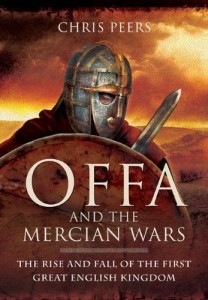Chris Peers
Offa and the Mercian Wars: The Rise and Fall of the First Great English Kingdom
(Pen and Sword, 2012) 198pp. $39.99
Chris Peers in Offa and the Mercian Wars writes an excellent popular military history of the medieval Anglo-Saxon Kingdom of Mercia and King Offa, and at the same time concisely integrates much of the latest scholarship on Anglo-Saxon studies into the narrative of the work, including issues of Anglo-Saxon migration, military tactics, and Christianization as contextualization for both Offa and the affairs of his kingdom. Peers does not make an overwhelmingly revolutionary argument, but even so still makes a fair point in that Offa should be studied and appreciated more as one of the more effective pre-Alfred era kings of the Anglo-Saxons, and that under his leadership, “it was the Mercian kings who dominated their neighbours and first earned the title of ‘kings of England’…men such as Penda, Wulfhere, Aethelbald and greatest of them all, Offa.” (5)
While at times Peers may over-speculate the importance and impact of Offa and Mercia in the ninth century with comparisons to Charlemagne and the future work of King Alfred of Wessex, he nonetheless does warrant and explain the actual positive and negative limitations placed on Offa studies, at least in terms of available narrative sources. Indeed, Peers’ main primary sources include the standards of The Anglo-Saxon Chronicle, Asser’s Life of King Alfred, and Bede’s Ecclesiastical History of the English People, besides Beowulf for a cultural background, the works of Nennius for a Welsh perspective, and the later post-1066 supplemental chronicles from Henry of Huntington and William of Malmesbury. Within the body of much of the book, however, the author also includes references to Saint’s Lives stories, such as the Life of St. Oswald and the Life of St. Guthlac. Yet, Peers makes use primarily of secondary studies, particularly for transmitting general knowledge and updated theories on Anglo-Saxon history. In addition he draws excessively from a few select monographs with sparse citations, but this does not take away from the validity of the information as a part of a work of popular military history.
Oddly enough, the character and description of Offa himself and his reign does not appear until the eighth chapter of the work, ‘The Glory of Britain.’ Indeed Peers devotes the majority of the book to background knowledge of the Anglo-Saxons, the history of Mercia itself, Anglo-Saxon battle tactics and weapons, and the general overall narrative of Offa and his predecessors, most significantly Penda, whom Offa claimed descent. Some of these topics are elaborated and defended by Peers, including the opposing theories or explanations where Bede and the Anglo-Saxon Chronicle and others fall short. An example of this would be Peers’ discussion of Offa’s Dyke, beginning with Asser in his Life of King Alfred who claimed that the structure of the Dyke lay “between Wales and Mercia stretched from sea to sea.” (136) Starting from this well-known example of Offa’s legacy, Peers, using support from secondary studies, claims that perhaps the Dyke was never built and manned together as one continuous fortification, but instead simply became associate with Offa’s name, even if it was a project committed to and worked on by multiple rulers from Mercia and other central English kingdoms.
In terms of specific, practical topics in medieval military history, the most informative chapter may very well be chapter seven, The Warrior in the Age of the Mercian Kings, covering Anglo-Saxon weaponry, a discussion of battle methodology and composition, as well as a brief mention of the question of Anglo-Saxon use of earthworks. The importance of the spear as the quintessential Anglo-Saxon and North Germanic weapon for the period also helps the reader picture in the mind the many images and extensive accounts of battle included by Peers in several other chapters which only simply follow a strict chronology of events. In fact, the inclusion of this chapter, alongside and earlier chapter on the makeup of the Anglo-Saxon soldiery, Kingdoms and Armies, serve as an excellent grounding point, as concrete considerations for the more practical side of military engagements of Offa’s period. That is, while the several chapters devoted and in many ways drawn directly from The Anglo-Saxon Chronicle, Bede, Malmesbury, and other chronicles are illuminating, the amount of names, events, and kings’ feuds may confuse the reader in Peers’ attempt to cover the entire Anglo-Saxon period in a concise as manner as possible.
Finally, the healthy amount of general Anglo-Saxon history found in chapters one through three, five, seven, nine and ten, does provide and establish Offa and the Mercian Wars as an excellent reader for anyone interested in the Anglo-Saxon period of Britain, though this comes at the expense of the main point of the book. Peers himself admits how little information that can be found on Offa himself, so this makes it surprising that for a book named after him, Offa does not appear until well after the half-way mark of the work. Again, as a popular history, this does not necessarily take away from the quality of the work, but it is still worthy of remark.
Overall, for general interest historical reading for the informed enthusiast of the Anglo-Saxon period, Offa and the Mercian Wars is an excellent point of entry for those interested in some of the problems and theories of the field. Moreover, professionals of the period will appreciated the fairly comprehensive job Peers has done integrating the latest scholarship and divergent theories on Anglo-Saxon studies, woven carefully into the both broad and specific ranges of each chapter in their many connections to Offa, existing in the work both as a king of Mercia and as a tool of analysis for Anglo-Saxon military culture.
Nicholas Wallace
Texas Tech University
[email protected]

